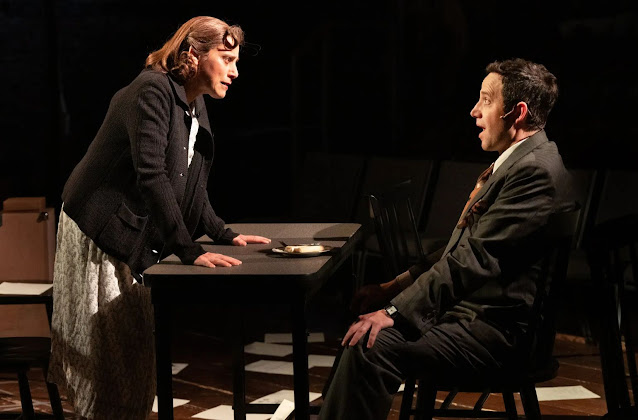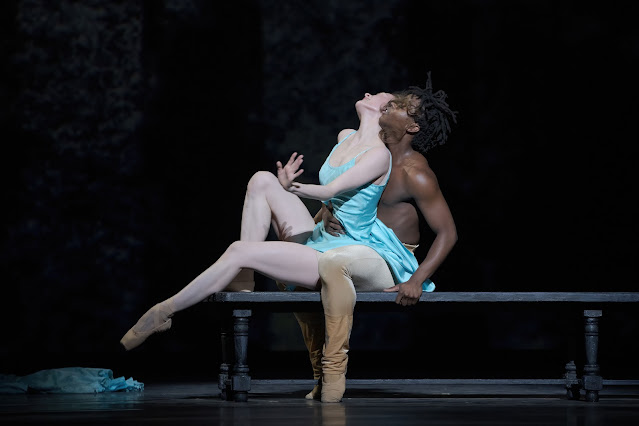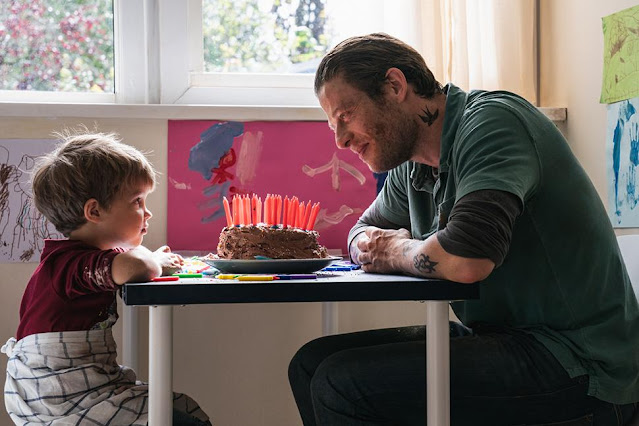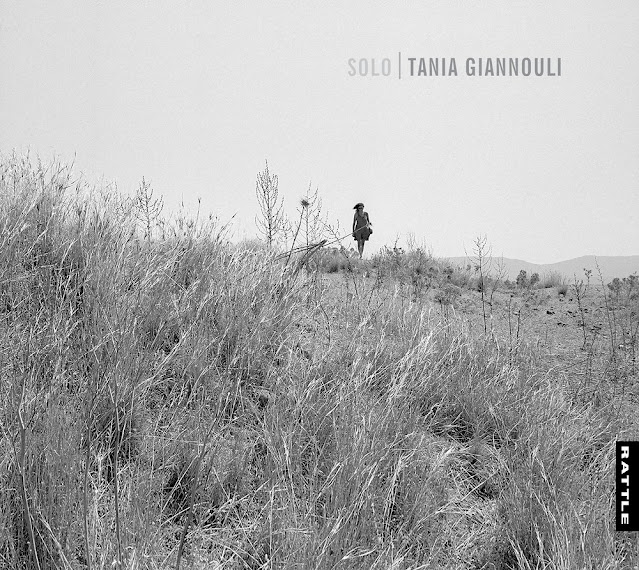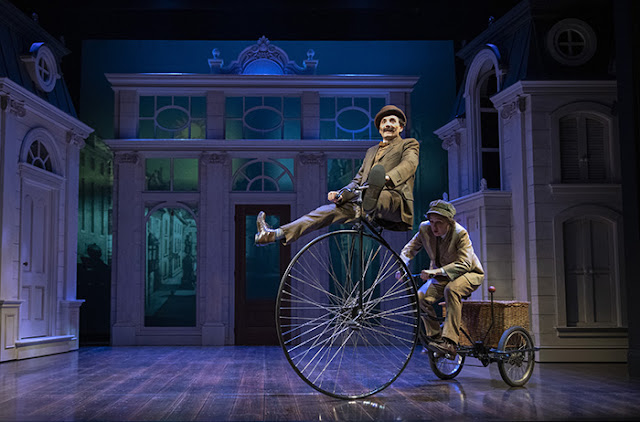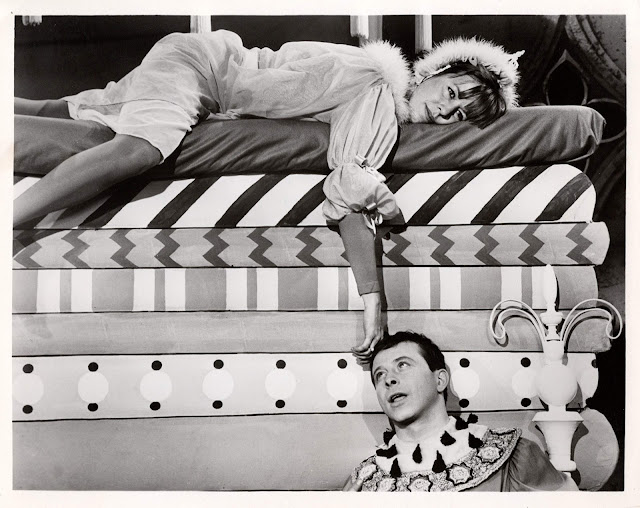 |
| Arnold Schoenberg, MS 96. |
“It’s all about starting in the middle of a musical sentence and then moving in both directions at once.” – John Coltrane
Man, we are a long, long way here from the dreamy and wistful harp pieces of the classical age, and it’s a fine thing too. In the hands of a masterfully gifted contemporary jazz composer and improviser such as Maria-Christina Harper, this historically tinged musical instrument acquires a whole new meaning. And the muscular heft to go along with it, as she pulls it further and deeper into the postmodern age, while still remaining true to the roots of its inception in a subtle way that honours her harp precursors, Dorothy Ashby in 1957-58, and Alice Coltrane in 1967-68. The blessing here is that on the new album release Passing By from Little Yellow Man Records, Harper (yes, in a delightfully charming piece of synchronicity, this edgy harpist’s name is actually Harper) is accompanied by the recently formed eponymously named Trio and joined by the restrained brilliance of Evan Jenkins on percussion and the fluid elegance of Josephine Davies on saxes. The results are stunning, in both their aggressive reach into a sonic future and their respectful evocation of a circuitous past. Together, they slam it.
 |
| Bygone days of the gilded age. |
An instrument which sounded and felt so sweetly gentle in the hands of the younger son of Sebastian Bach in his Sonata for Harp in G Major, or enigmatic in Beethoven’s Six Variations on a Swiss Song, had even evolved eventually into a 20th-century modernist experiment in atonality in the visionary fingertips of Luciano Berio or Elliott Carter. But it was in the jazz canon that the harp suddenly assumed a truly startling arrival into Nowness, first in the still wistful but advanced Dorothy Ashby, followed by the cosmic vibrations of the great Alice Coltrane a decade later. And now we are permitted an even deeper dive into the Now, with Harper’s trio of ideally matched musical partners. Their debut release as a trio (which follows on the heels of her solo album Gluten Free and a duet album with lute player Yiagos Hairetis called Draft) features her uniquely tuned electric harp in tandem with her subtle sonic effects and bowing. I thought there was a bass player until I realized Harper was supplying it in her spare time.
The composer is here sharing space and time in an exemplary fused fashion with Jenkins and Davies. Far from this accomplished sax player and versatile drummer accompanying the harpist, however, here they are all engaged in a three-way conversation taking place in the space between their notes. Their jointly created music is perpetually beginning and ending at the same time, in keeping with that majestic insight expressed so well by Trane: the notion that sounds can be free enough to erupt from a shared centre (with the right partners) and then swiftly, or slowly, shift in either direction, towards a commencement or a conclusion, or both. This is interstitial music indeed, co-created according to what Trane also once referred to as “natural laws,” a sense of liberty within the form whereby content assumes its own austere gravitas, and I’m also reminded of his other amazing admonition, “Listen, you can play a shoestring if you do it with enough authenticity.”
.jpg) |
| Dorothy Ashby, 1958. |
 |
| Alice Coltrane, 1968. |
 |
| Maria-Christina Harper, Stavros Centre. |
The Harper Trio’s shared expedition into an exotic domain of melting away the sonorous time in between their notes, a constantly shifting sonic plateau that occasionally evokes the ambient poetry of Harold Budd or Jon Hassell, while still remaining embedded in a raw free jazz neighbourhood, is punctuated with emotive renderings that occur at the very edges of each instrumentalist’s impressive capabilities. Perhaps for that reason, I was struck by a visual depiction by the revolutionary composer Arnold Schoenberg, whose untitled ‘drawing’ on music composition paper features dramatic cut-out shapes periodically interrupting the flow of notes. Which is a virtual emblem for the music birthed by this talented combo (three musicians, seven pedals). These spaces, or silences physically removed from his notations, seem like a kind of echo in reverse of the Harper Trio’s interest in the subtle aural action taking placed in between the shared notes they are playing. This is music where the makers are leaning towards each other as performers.
Another of Trane’s characterizations, that of permission to play absolutely anything as along as it is also found in nature, is marvelously illustrated by the trio’s video for the title track, “Passing By,” performed together in a farm field somewhere, with spaces between the players mirroring the spaces between them in the album’s cover image, and, once again, of the spaces between the notes they emit together. Although I myself am personally at two with nature I do understand the fact that those who are at one with it find a symphony of sounds emerging from the lurking silences hovering around them when they sit in fields, or riverbanks or forests. There is clearly a pristine order in the disorder of sounds populating the natural environment, where simultaneous songs chirped by birds or insects all merge into one wavelength. Here, it’s almost a sonic storm of sorts, with notes, riffs, solos and melodies replacing the bird flock.
And so it is with the Harper Trio’s new album. The title piece in particular seems to embody that flight pattern between the performers, as do “Castle Hill Road” and especially “East Hill Meditation,” which feels to the bloodstream of the listener precisely like what its title suggests. In each case, the three players, each of whom is actually in the middle of their structural unit, all move in both directions at once (pace Trane) towards the other two members of the trio. The resulting shared murmur, a cluster of notes touching each other, a constellation of flickering sounds coming and going, is a veritable reverie for the ears. Sometimes, as in “Standing Alone,” there are big bonfires of silence embedded in the player’s interactions. While in “In Cairo/Grandma’s Coat,” the languid piece unfolds like a still smoldering campfire after the sitters have all gone to sleep. And “A Greek in Spain” spins a mesmerizing web of fine translucent threads as it slowly engages the trio in a subtle dance of instrumental intimacy of a sort one rarely encounters.
 |
| Harper Trio, 2023: Evan Jenkins, Maria-Christina Harper, Josephine Davies. |
“A Greek in Spain” is also a piece that really breaks through to the other side. I don’t know how, but it’s as if a three-way love affair had been arranged between a flaming flamenco playing guitar and harp alternately, a tripping vagabond Art Pepper taking mystic runs and a lovely Max Roach stampede culminating back in the same quiet place everything inexplicably emerged from. While Ashby was lyrically daring in her tight combo setting, using only either her harp, a drummer and a bassist, or her harp and a flutist with no percussion at all; and while Coltrane was exuberantly insistent, propelled forward by the rhythm section of her late husband’s band, Garrison and Ali, Harper’s compositions and her deft, almost clairvoyant interplay with her fellow players plunge us headlong into the arms of what those two visionaries may have been pointing toward on the horizon.
Indeed, with this new triumvirate departure, which can accurately be called a selection of ‘cinematic soundscapes’, Harper and her fellow musicians take us to an entirely new place, even within the borders of what we customarily call the new music idiom. She has asked sincerely, “Why shouldn’t the harp have its own Jimi Hendrix?” and the resounding answer is, no reason at all. Time for lift-off. Also accurate is the assessment that their music combines Greek and Eastern scales with Western advanced jazz, creating a fresh sound for which she expresses the hope that it isn’t “too harpy” (don’t worry, it isn’t). Based in London, the trio first encountered each other in the seaside town of Hastings, where a quieter lifestyle pace enabled an unrushed exploration of the edges they could travel together musically.
“We knew we were onto something special from our very first rehearsal. It was an exciting and special moment,” Harper has observed, expressing some of the combined gratitude for the synchronicity of their first creative voyage. When you listen to The Harper Trio’s new ideally titled album Passing By, you too will be invited into the unique space and time they concoct together. Somewhere, Alice Coltrane is smiling. This group has picked up her mantle and carried it forward into a new and compelling territory: far from monastic in tone, they are a quantum-level trio, conversing in an interstitial language of subtle thresholds, as they recursively pass by our world.
 |
| Little Yellow Man Records |
Harper Trio is:
Maria-Christina Harper, an award-winning, Hastings-based, jazz, avant-garde harpist, composer and songwriter. She is the first prize winner of the Wales International Harp Competition (2010), performing her own compositions on the electric harp. She studied the harp with an entrance scholarship at the Royal Academy of Music and released her solo album Gluten Free as MC & the 7 Pedals with Valentine Records. She was also part of the avant-garde folk duet Hairetis Harper, who released their album, Draft (Same Difference Music, 2020), which received exceptional reviews. Maria-Christina has toured or collaborated with many artists, including Katie Melua, Soft Cell, Anni Hogan, Alani, Jeremy Reed, Ala.ni, Richard Strange, Pete Long, Georgina Jackson, and Psarantonis,
Josephine Davis, winner of the 2019 Parliamentary Award Jazz Instrumentalist of the year, is a musical artist at the forefront of the UK contemporary music scene, pushing the boundaries of jazz with an emphasis on extended and collaborative improvisation. As a saxophonist she is known for her melodic focus, versatility and unique style, which has been described as “consistently inventive” (Jazzwise Magazine), “strong and authoritative” (The JazzMann) and “with winning immediacy” (MOJO Magazine). Now becoming equally known as a composer, her unique voice is a blend of classical, jazz and folk music, creating an intensely dynamic sound infused with the Nordic quality of her Shetland roots. Deeply influenced by the American composer Maria Schneider, Josephine was resident composer and tenor player for the London Jazz Orchestra from 2011-2016, and now has her own big band The Enso Ensemble.
New Zealand-born Evan Jenkins studied jazz at the Western Australia Academy for Performing Arts and soon after was named Drummer of the Year at the West Australian Music Industry Awards. During this time, he played with the Western Australia Symphony Orchestra, and toured the country with the late, great Ronnie Scott. He has been a resident of the UK (now based in Hastings) for over 30 years becoming a much in-demand drummer. An original member of The Neil Cowley Trio, Evan’s recording/live credits also include performances with Eric Clapton, Van Morrison, Robben Ford, Tom Jones, Bert Jansch, and Ben Watt.

–
Donald Brackett is
a Vancouver-based popular culture journalist and curator who writes
about music, art and films. He has been the Executive Director of both
the Professional Art Dealers Association of Canada and The Ontario
Association of Art Galleries. He is the author of the recent book Back to Black: Amy Winehouse’s Only Masterpiece (Backbeat Books, 2016). In addition to numerous essays, articles and
radio broadcasts, he is also the author of two books on creative
collaboration in pop music: Fleetwood Mac: 40 Years of Creative Chaos, 2007, and Dark Mirror: The Pathology of the Singer-Songwriter, 2008, as well as the biographies Long Slow Train: The Soul Music of Sharon Jones and The Dap-Kings, 2018, and
Tumult!: The Incredible Life and Music of Tina Turner, 2020, and a book on the life and art of the enigmatic Yoko Ono, Yoko Ono: An Artful Life, released
in April 2022. His latest work in progress is a new book on family
relative Charles Brackett's films made with his partner Billy Wilder, Double Solitaire: The Films of Charles Brackett and Billy Wilder.




.jpg)







